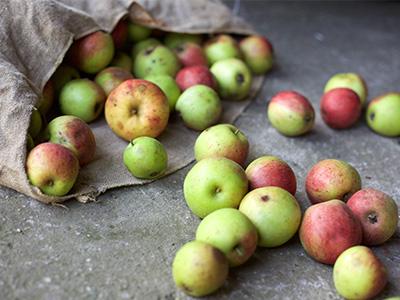
Work Package Improved food and drink production
Introduction
About one-third of the edible parts of food produced for human consumption are lost or wasted globally. More specifically up to 50% of edible food is wasted in European Union (EU) households, supermarkets, restaurants and along the food supply chain every year, despite 79 million EU citizens living beneath the poverty line and 16 million depending on food aid from charitable institutions. Currently 88 million tonnes of food (173 kg per capita) per annum is wasted in the EU and this is projected to increase by 40% by 2020 if no action is taken. Similarly, about 1.35 million tonnes of food and drinks (252kg per capita) is the current waste estimate for Scotland. Food waste collection and disposal costs for Scottish councils amount to £85 million per year. 570,000 tonnes of food and drink per year is wasted by Scottish households whilst at the farm level the primary losses vary according to the production system, e.g. potatoes are estimated to average ~20% with analogous losses for other crops, but lower values for livestock. In the current environment of increasing global population and climate change pressures on agricultural production, identifying efficient means of reducing crop-to-food loss and waste across the supply chain is one of the main actions we can take to safeguard food security.
Aim of Research
The aim of the proposal is to undertake an assessment of food waste along food supply chains (dairy, fruits and vegetables) and consumption in Scotland, and provide coherent and robust strategies to reduce food loss and waste across the chain and, where waste cannot be reduced, identify valorisation routes for coproduct/income generation.
Progress
Research created a portfolio of extracts as a nature-based biocides database comprised of feedstock data, extraction standard operating procedures, extract compounds chemistries and biocidal activities, identifying individual polyphenolic components with potent antimicrobial activity and allowing the mining of previously obtained compositional data on various berry extracts as potential sources of antimicrobial activity within other waste streams.
Engaging agri-food and industrial biotechnology stakeholders, research has identified the sources and polysaccharides in the Scottish agricultural and food bioarisings, and viable opportunities for capturing value from these feedstocks for products across multiple sectors, which could deliver both economic returns and net zero emissions and potentially replace fossil fuel-based products.
Using primary survey data on food consumption and waste, research has developed a framework for predicting food waste linked to food security at household level in Scotland. Relevant to the current discourse on household food waste during the Covid-19 pandemic, the findings suggest that household food waste behaviours during shock are influenced by food insecurity, attitudes, need for cognitive closure, shopping patterns, perceived behavioural control, subjective norms, good provider identity.
Research using primary survey data from Scottish households and literature reviews on perceptions of risk, uncertainty and safety as elements to understanding food purchase and utilisation during the COVID-19 pandemic, estimated the impact of factors such as consumers’ enhanced food safety risk perceptions and distrust towards the stability of the food system in response to the pandemic on food purchase and consumption behaviour and the potential variation in food waste generation.
Using interviews and focus groups, research analysing the impact of COVID-19 lockdown on the demand, supply, waste, and on-farm management in the Scottish dairy industry identified production and financial effects across the supply chain, with waste occurring due to e.g., disposal of uncollected milk and the associated potential long-term impacts on GHG emissions and waste and made recommendations on measures to achieve resilience.
Research investigated the relevance of information sharing across resilient supply chains to reduce food waste in the Scottish context during the COVID-19 outbreak using semi-structured interviews with stakeholders and literature reviews. Findings suggest a need for innovation, contingency planning, skills and infrastructure investment targets, regulations and funded opportunities for businesses.
Research using primary survey data on the popularity of fruit and vegetable box schemes among Scottish consumers and the Covid-19 pandemic impacts on their preferences and demand for these schemes and associated food waste reduction strategies identified reduction of food waste as one of the factors influencing willingness to pay behaviours, and the need for further customisation potentially leading to further reduction of food waste.
Highlights
It is estimated that Scottish households throw away 630,000 tonnes of food waste every year. To better understand this, researchers created a database of survey responses on the relationship between household food waste-related behaviours and actual and perceived food insecurity, such as income and price sensitivity, and actual or perceived food availability during the COVID-19 epidemic and following Brexit. Allied to this, a publication addressing industry level waste, identified the carbon footprint of food losses, the causes of milk losses, calculated the associated emissions, and suggested mitigations that would both improve productivity and reduce GHG emissions.
The role of SRP research in helping reduce food waste though improved and sustainable production was discussed at Scotland's Climate Ambition Zone - Is cheap food costing the earth?, hosted by Zero Waste Scotland. Two media interviews were given on sustainable food for the BBC News.
Funding has been secured (£800k, on a call off basis) by SEFARI researchers, in collaboration with Zero Waste Scotland, and academic and commercial partners, to develop a systems model that will deliver evidence led, actionable, high-impact recommendations to guide policy and activity and contribute to sustainable change and a thriving Scottish bioeconomy. The framework grant funding will run from 2022 to 2026.
A SEFARI researcher presented SRP research findings on the behavioural modelling of food waste and food security linkages using Scottish household survey data at a RESAS seminar (September 2021), with more than 50 policy makers in attendance.
During the fifth year the work on the estimation of partial equilibrium scenarios of the social and environmental impacts of food waste reduction has been completed. Scenarios were run on data previously collected under this RD and new data collected in 2020 using two consumer representative cross-section surveys on food redistribution (social impacts) and carbon and waste footprint (environmental impact). Impacts of factors on consumers’ intentions to reduce waste through food redistribution (social supermarkets) and respectively to purchase low carbon and waste footprint food were estimated, with results run into the simulation analysis. Survey data was analysed using causality analysis (structural equation models) to estimate the impact of the main factors influencing public attitudes and behaviour (willingness to purchase food products with low waste and carbon footprint) towards food waste and carbon footprint reduction, and respectively the main factors influencing public attitudes towards food waste reduction through food redistribution, i.e. willingness to mitigate food waste through shopping behaviour linked to social supermarkets.
The push for the circular bioeconomy has expanded significantly at both Scottish and UK level. The work throughout the years has matched this with the delivery of the identification and characterisation of cereal crop primary and processing waste/co-product polysaccharides for exploitation. This has resulted in discussions with cereal based companies to look at new co-created projects going forward. In addition, the previous work has led to pan European projects such as Plants4 Life (EU-Life) and Optiberry (ERA-NET) looking at fruit waste valorisation in new areas such as plant protections and processed foods, respectively. Aligned with this significant engagement at primary, secondary and NGO level has seen the area maintain both relevance and impact across the year. The work to date should be viewed as support for the Circular Economy bill progression in 21/22. The valorisation of primary and secondary crop wastes has been brought sharply into focus in this year with the greater push for net zero as a result of COP26 in Glasgow 2021 and the announcement by Scottish Government to commit £1.6Bn over the next 5 years to support and drive Scotland’s green recovery and end our contribution to climate change. As part of this push, here we progressed the development of bioresources such as our cereal straws and development opportunities and routes to markets have been developed here for such agri-wastes/co-products. This has supported the development of a Tay Cities Deal Centre for Agricultural Sustainable Innovation (£5M) within which biorefining, the development of multiple products from biomass as a feedstock, will be embedded. This will allow the SRP work to transit the TRL scale to full commercialisation and rural economic development.
Highlights
- SRP publication has highlighted that the need for better coordination between food waste and safety policies was identified.
- Innovate UK funding, underpinned by SRP expertise, is valorising agri-waste in development of sustainable Personal Protective Equipment (PPE) (Novel nanocellulosic composites as antivirals and antimicrobials for new PPE materials; NanocellPPE, [£0.5M]). The project targets absorbent materials with better multiuse protection, reducing waste streams and environment impact.
- Several knowledge exchange meetings with stakeholders were held in 2020-21 where the team presented their latest research, including: invited talks at the Defra & Agricultural Economics Society one-day conference ‘Strengthening resilience in the food supply chain’ (Dec-20), and the International Society for Economics and Social Science on Animal Health 2020 conference (Nov-20), discussing “Tackling food waste and improving food safety to boost resilience” and “Reconciling health, welfare and the environment. Economics of surveillance and beyond” respectively; a presentation to industry attendees at the Dundee and Angus Chamber of Commerce; meetings with NFUS on waste valorisation; workshop with Zero Waste Scotland on social and non-social science collaboration on food waste modelling; meeting with SEPA on implications of use of antimicrobials for environment and food waste; participation on expert panels for the European Commission Horizon 2020 and ERANET.
Research has focussed on equilibrium modelling to assess the environmental and social sustainability of waste prevention and mitigation beyond food supply chains, and analysis of waste valorisation into feedstock for conventional food and beverage processing.
Design of a partial equilibrium model assessing wider impacts of waste reduction has been completed. The model presents a baseline where food waste occurs at either supply (primary production) or consumption levels and compares it with alternative simulation scenarios hypothesising changes to waste due to uptake of technologies and animal health/welfare control on farm, and changes in food consumption patterns linked to e.g. labelling and redistribution. The analysis uses a dataset combining data from secondary sources (trade, production and consumption) and primary data from farm and consumer surveys conducted in this research deliverable in years 2 and 3 (food waste levels and mitigation measures in dairy and the fruit and vegetable industries, and respectively household food waste based on shopping and food preparation behaviours) and year 5 (carbon footprint and redistribution aspects of waste in consumption). The model will be estimated in year 5.
A report on fruit valorisation as feedstock for conventional food and beverage processing, as well as providing material for food supplements, colouring foods has been completed. In support of this a database of the Scottish produce colour components, predominantly anthocyanins, has been constructed. This work was supported by continued stakeholder engagement and built on by the exploitation of the anthocyanins as a source of crop bio-stimulation and protection via the following project: 2019-2022. LIFE18 ENV/NL/000043 - LIFE Plants for Plants: Boost conventional agriculture’s confidence: new organic bio-stimulants to reduce water, nutrients and pesticide demand (2M Euro).
Outputs have been translated into three peer-review publications, and invited presentations at the NFUS, Scottish Resources Conference, a seminar of the European Association of the Agricultural Economists, and the Nanjing Agricultural University. Funding leverage success – Researchers secured funding from the ERA-Net Co-fund FACCE SURPLUS (‘Sustainable & Resilient agriculture for food and non-food systems’). The OPTIBERRY project (€0.92M) ‘Optimal use of by-products of berry fruit production - https://projects.au.dk/faccesurplus/research-projects-3rd-call/optiberry/ ’ which uses techniques honed in the RD work to target innovative processing and biorefinery/extraction concepts to create food prototypes and (non)-food ingredients from sustainable biomass, esp. non-premium fruit.
Research has focussed on approaches to waste reduction and valorisation. Highlights have been the development of the participatory workshops and dynamic analysis of household waste behaviour leading to recommendations for waste reduction strategies. These have been supported by a strong portfolio of engagement and dissemination with the production industry and Zero Waste Scotland. The valorisation of waste has proved successful with collaborative industry projects delivering new routes to food grade proteins and ingredients from primary agriculture waste such as oilseed presscake and class two soft fruit.
Research included multidisciplinary analyses as regards food waste cost, footprint, efficiency, causality and collaboration in the supply chains. The analyses estimate causes and amounts of milk loss and associated greenhouse gas emissions on dairy farms; cost-efficiency of dairy farms based on ability to adopt waste mitigation measures; and efficiency of dairy farms in terms of both maximising production and reducing environmental footprint (milk waste).
Highlights
A briefing on Horticultural Food Waste in Scotland outlined measures for positive change to ensure that more food from Scottish fruit and vegetable farms makes its way along the food supply chain as intended, without being wasted. Findings were disseminated to the industry through trade publications (The Scottish Farmer; Farmers Guardian; Fresh Produce Journal) and local newspapers.
Group Model Building workshops with stakeholders including Scottish Government, Zero Waste Scotland, WRAP, Food and Drink Federation Scotland, National Farmers Union Scotland, Scottish Environmental Protection Agency, Agriculture and Horticulture Development Board, and the Soil Association focussed on how causes of food waste, e.g. through antibiotic residues in milk, can be mitigated through incentives to farmers and collaboration with others along the dairy supply chain.
A stakeholder workshop focussed on causes and solutions for food waste/loss reduction in the fruit and vegetable supply chain linked to pest control was attended by farmers, Scottish Government, Zero Waste Scotland, Scottish Environmental Protection Agency, Scottish Natural Heritage, Buglife Scotland, National Farmers Union Scotland, Soil Association and Linking Environment And Farming.
Research has focused on primary data collection and multidisciplinary analyses as regards food waste efficiency in the dairy/fruit and vegetable supply chains. Research on food waste and losses in primary production and the impact of consumers’ understanding of date labelling on food waste behaviour has been published in high impact factor journals, and presented at key academic conferences and stakeholder meetings, and included in undergraduate and postgraduate education activities (teaching and MSc dissertations). It led to secured funding linking into this research such as an Interreg Europe project on resource efficiency on dairy farms, a PhD studentship on innovation and collaboration to mitigate food waste in the fruit and vegetable supply chain, and a European Commission Horizon 2020 project on sustainable uptake of legumes.
With regard to food and drink waste reduction new plant breeding techniques have been used to generate populations of potato plants that will be resistant to bruising and low temperature sweetening. Work has identified potato haulms as a source of potent bioactives and these have been tested with a view to commercial exploitation.
Highlights
A stakeholder workshop on loss and waste prevention along food supply chains was organised with attendees from the Scottish Government, Zero Waste Scotland, Waste and Resources Action Programme, Food and Drink federation Scotland, National Farmers Union and across SEFARI.
Research has focussed on accruing datasets from various sources such as WRAP, quantitative surveys and in-depth interviews to identify causes of consumer food waste and waste at the farm level on horticultural and dairy farms. The data has been mined to identify factors that influence food waste behaviours. The emergent conclusions, including the removal of best-before dates having a positive impact on waste reduction, have been the focus of significant engagement activities at stakeholder conferences and via scientific publications.
Analysis of data on waste behaviours at household level show that socio-demographic characteristics, perceptions regarding the need for better and clearer information about ‘best before’ and ‘use by’ date labelling on food products, frequency of checking date labels when shopping and preparing meals, and understanding of ‘best before’ and ‘use by’ labels have significant effects on behaviours related to lower food waste.
In-depth interviews with soft fruit and vegetable growers in Scotland identified that farmers consider food waste to be an intrinsic part of farming. Farmers do not routinely record waste and have difficulty in providing estimates for food waste and losses. Many of the causes of food waste identified in this study are due to factors further along the food supply chain, including cosmetic specifications by retailers, and a lack of processing facilities.
Waste valorisation activities operated synergistically with Zero Waste Scotland and the Industrial Innovation Biotechnology Centre and delivered a unique and ground-breaking report, “Biorefining Potential For Scotland: Mapping Bioresource Arisings Across Scotland”, that identified the wastes, by-products and agricultural residues (bioresources arisings), totalling 27M Tonnes annually that are, or which could be, available as feedstock for the biorefining process and be a basis for the creation of new business opportunities.
Highlights
A food waste prevention game was trialled at the Royal Highland Show to identify the influence that product price versus knowledge of the product's supply chain waste had on purchasing behaviours.
Future Activities
The research on food waste prevention will continue in the Environment, Agriculture and Food Strategic Research Programme 2022-2027 as part of the project SRUC-C4-1 ‘Building the circular economy: sustainable technologies, green skills, and upscaling behaviours’. The scope of the new project encompasses waste prevention with a larger focus on multiple sectors as relevant to the Scottish islands and highlands.
Additionally, the research feeds into the Environment, Agriculture and Food Strategic Research Programme 2022-2027 project SRUC-B4-4 ‘Food and drink innovations – models of policy support and other incentive mechanisms’, where uptake of innovations will consider the waste implications along Scottish agrifood supply chains.
The research also feeds into a recently won grant funded by Zero Waste Scotland ‘Circular Bioeconomy Research and Analysis Service Framework Agreement (2022-2026).
Selected Outputs
Publications and other outputs
2016/17
Impact of information transfer on farmers' uptake of innovative crop technologies. A structural equation model applied to survey data. (2016) – paper published in The Journal of Technology Transfer by Luiza Toma et al.
2017/18
Food waste and losses in primary production: qualitative insights from horticulture. (2017) – a paper published in Resources, Conservation and Recycling by Ciara Beausang et al.
Impact of consumers’ understanding of date labelling on food waste behaviour. (2017) – a paper published in Operational Research by Luiza Toma et al.
2018/19
The effect of date labels on willingness to consume dairy products: implications for food waste reduction. (2018) – a paper published in Waste Management by Bethan Thompson et al.
Horticultural Food Waste in Scotland. RPC research briefing published in May 2018.
2019/20
Food Waste and Food Safety Linkages along the Supply Chain (2020) – paper published in Eurochoices by Luiza Toma et al.
Date-label use and the waste of dairy products by consumers. (2019) – paper published in the Journal of Cleaner Production by Bethan Thompson et al.
Food waste in primary production: Milk loss with mitigation potentials. (2019) – paper published in Frontiers in Nutrition – Nutrition and Sustainable Diets by Margaret March et al.
Conferences
Toma, L., Hall, C., Thompson, B. 2017. Investigation of the influence of food waste behaviours on household food waste. Contributed paper at the 15th EAAE Congress ‘Towards Sustainable Agri-Food Systems: Balancing between Markets and Society’, Parma, August 2017
Thompson, B., Toma, L., Revoredo-Giha, C., Barnes, A. 2017. Impact of Expiry Date Knowledge on Household Dairy Product Waste. Contributed paper at the 15th EAAE Congress ‘Towards Sustainable Agri-Food Systems: Balancing between Markets and Society’, Parma, August 2017
Toma, L., Hall, C., Revoredo-Giha, C., Thompson, B. 2019. Household food waste behaviours – a causal analysis of cohort data. Contributed paper accepted for presentation at the 168th EAAE Seminar “Behavioural Perspectives in Agricultural Economics and Management”, 6-7 February, 2019, Uppsala
Toma, L. 2019. Technological uptake and efficiency. Case studies on food waste and animal health in primary production. Plenary presentation at the 173rd EAAE Seminar ‘Sustainable and resilient farming systems in the European Union’, Bucharest, September 2019
Toma, L. 2019. Will we still be wasting food in 2050? Invited presentation at the ‘Scotland Dinner plate 2050’, Dynamic Earth, Edinburgh, May 2019
Toma, L. 2019. Economics of food waste – supply chain observations. Invited talk, Nanjing Agricultural University, Nanjing, June 2019
L. Toma, B. Thompson, M. March, K. Rich, M. Haskell, G. Jamieson, S. Martin, S. Mcdonald, W. McManus, D. Michie, I. Murdoch, J. Redshaw, B. Strathie, M. Tomlinson, H. Walls, S. Williams. 2019. Stakeholders and systems dynamics – Group Model Building applied to AMR & waste in dairy supply chains. Contributed presentation at the workshop ‘Food waste – too many definitions’, Agricultural Economic Society annual meeting, 15 – 17 April 2019, Warwick
2020/21
Peer-reviewed publications
Food Waste and Food Safety Linkages along the Supply Chain (2020). – paper published in Eurochoices by Thompson et al
Presentations (Academic)
Keynote talk at the International Society for Economics and Social Science on Animal Health 2020 conference, Reconciling health, welfare and the environment. Economics of surveillance and beyond University of Copenhagen, November 2020
Articles in popular press
Food safety confusion fuels food waste, an article published in The Scottish Farmer in 2020.
2021/22
Peer-reviewed publications
Food Waste in Primary Production: Milk Loss with Mitigation Potentials (2021) – paper published in Front. Nutri. by Cooper et al
Presemtations and reports
Report Circular Bioeconomy Opportunities Valorising Agri-Wastes and Co-Products arising from a SEFARI Gateway fellowship
Circular Economy in Food and Farming Systems (2022) Invited talk at the Scottish Parliament -Circular Economy - Cross Party Group - Food and farming systems meeting
Toma, L., Malerich, M., Berri, A. 2022. Insights on the relationship between food waste and food security at household level. Contributed paper at Agricultural Economics Society 96th Annual Conference 2022, KULeuven
Akaichi, F., and Toma, L. 2022. Customisable or local? Consumers' preferences and willingness for the characteristics of fruit and vegetable box schemes in Scotland. Contributed paper at Agricultural Economics Society 96th Annual Conference 2022, KULeuven
Toma, L., Malerich, M., Berri, A., O’Rourke. E. 2021. Insights on the relationship between food waste and food security – case studies on Scottish consumers behaviour. Invited talk at the RESAS seminar series (online). 22th September 2021
Stewart, D., Toma, L., Costa-Font, M., Akaichi, A., March, M., Haskell, M., Thompson, B., Ferreira, J. Contributed presentations at ‘Food waste behaviours under systemic shocks' RD3.1.4 workshop, 29th March 2022
Gateway blog
Social and environmental aspects of food redistribution.








